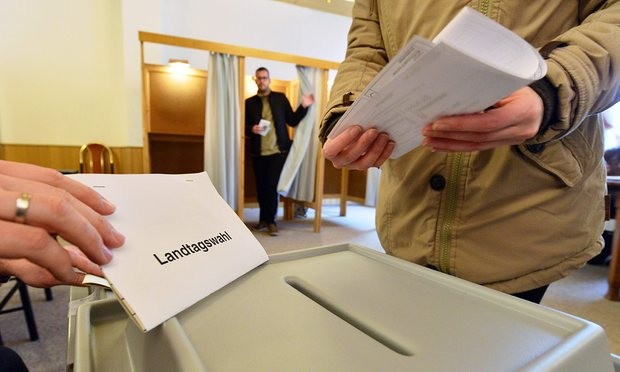Merkel’s refugee policy sees a hiccup amid state elections

Voters in three German states are heading to the polls in regional elections seen as a litmus test for Angela Merkel’s management of the refugee crisis.
The elections in Baden-Württemberg, Rhineland-Palatinate and Saxony-Anhalt are the first to take place in Germany after a dramatic seven months that have seen the public become increasingly polarised over their chancellor’s open-border stance. Well over 1.1 million refugees have entered the country in the past year or more.
The anti-refugee party Alternative für Deutschland (AfD) is expected to enter parliaments in all three states for the first time – a historic achievement for a party that seemed close to collapse when its founder left the group last year, but has seen its fortunes revived on the back of discontent with Merkel’s refusal to cap the number of asylum seekers entering the country.
In Saxony-Anhalt, the AfD are projected to gain as much as 18%, overtaking the Social Democrats to become the third-biggest party in the state. However, the populist party led by Frauke Petry will not be able to form part of the government in either of the three regions.
Merkel’s party faces a potentially humiliating defeat in its traditional stronghold in Baden-Württemberg. The CDU has been the biggest party in the home state of the finance minister Wolfgang Schäuble since the end of the second world war, but has found itself pipped to the top spot by the Green party in recent elections.
In Rhineland-Palatinate, the incumbent Social Democrat state premier, Malu Dreyer, is neck and neck in polls with the conservative candidate Julia Klöckner, widely seen as a possible successor to Merke
l.Klöckner, like the CDU candidates in the other states, has partially distanced herself from her leader’s strategy for the refugee crisis during her campaign. As a result, a defeat for the Christian Democrats on Sunday night may not necessarily be seen as a substantial blow to Merkel’s leadership.
According to Frankfurter Allgemeine Sonntagszeitung newspaper, the chances of the German chancellor’s authority being called into question by bad results for her party are “unlikely, but not out of the question”.
Authorities are expecting a higher turnout than usual after Baden-Württemberg reported a turnout of 32% only a couple of hours after voting booths opened.
An exit poll by ARD television showed the AfD winning 12.5% of the vote in Baden-Württemberg, 11% in Rhineland-Palatinate and 23% in Saxony-Anhalt, a relatively poor eastern region.
The poll also showed Merkel’s CDU finishing second to the left-leaning Greens in Baden-Württemberg, and to the Social Democrats in Rhineland-Palatinate. It had hoped to win both states.
How to submit an Op-Ed: Libyan Express accepts opinion articles on a wide range of topics. Submissions may be sent to oped@libyanexpress.com. Please include ‘Op-Ed’ in the subject line.
- Libya’s HCS invites applicants for key state roles - December 31, 2023
- UK calls on Iran to prevent escalation in Israel-Hamas conflict - November 05, 2023
- Libyan Interior Minister: Immigrant shelter costs a fortune - November 05, 2023


